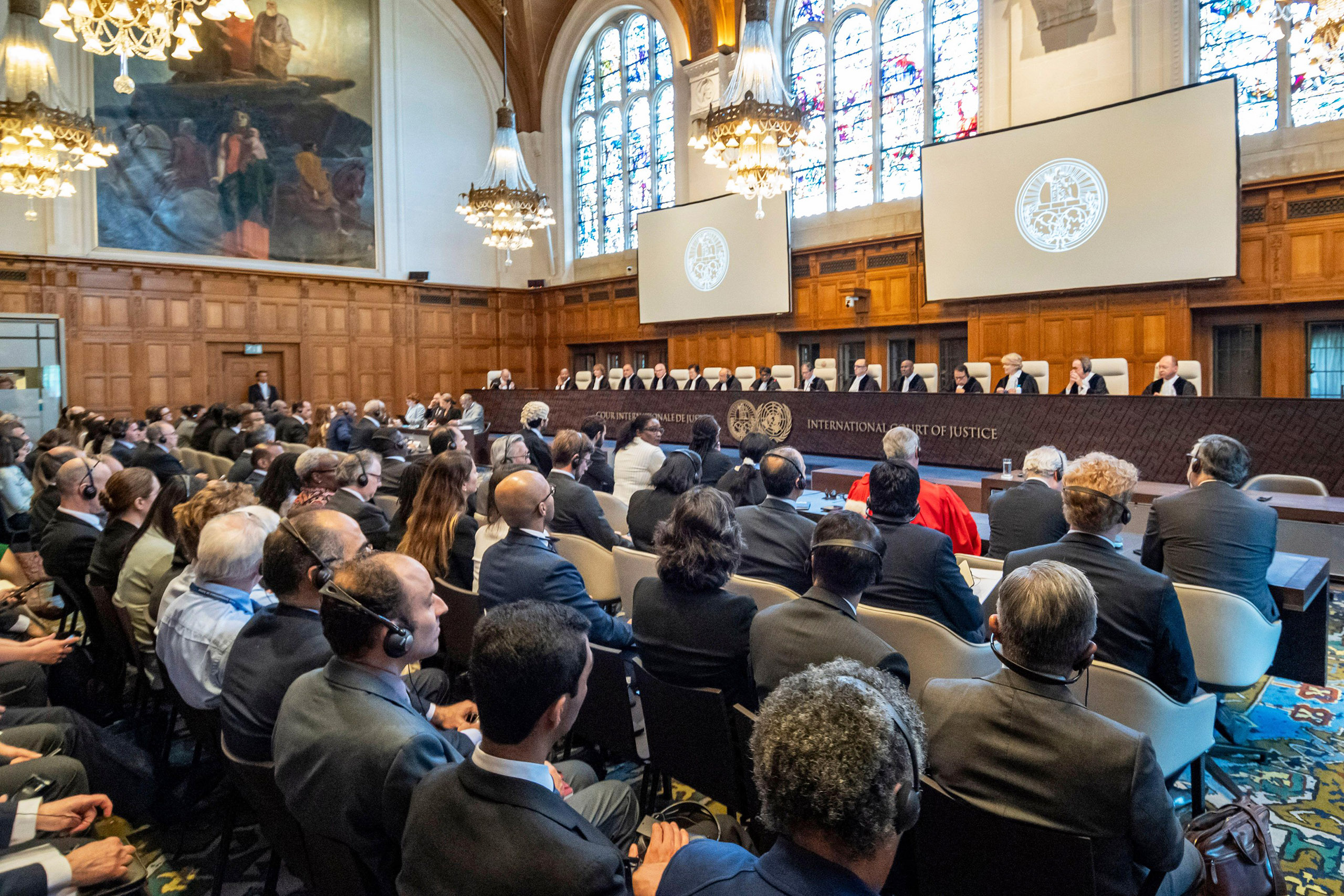The world’s highest court has just given the Australian government a giant climate headache. For all the rhetorical, political and practical support Australia offers the small Pacific island neighbours most exposed to rising tides and a heating planet, Australia has drawn the line at endorsing a right to sue over their circumstances. But now the International Court of Justice says maybe they can.
In the largest multi-country case it’s ever heard, the ICJ has significantly increased the prospect of nations and individuals whose lives are being ruined by climate change being able to hold other countries legally responsible. And in an extra indignity, the only Australian on the fifteen-member bench, Hilary Charlesworth, has added extra remarks to the court’s ruling specifically rejecting her nation’s key arguments against exactly that.
Australia was among dozens of countries that backed a bid by law students from Vanuatu to persuade the UN General Assembly to take their case on climate action to the ICJ. But once two years of lobbying saw the students succeed in 2023, Australia was among a small group urging the court to limit the extent of nations’ legal obligations to protect the globe from harmful greenhouse gases. Australia insisted that complying with international law only involved upholding obligations under climate treaties — and exporting fossil fuels didn’t constitute a breach. The court disagreed.
On behalf of the students, the UN sought an advisory opinion from the ICJ, posing two questions about countries’ responsibility to prevent climate change in the context not just of international climate treaties but also of human rights law. The judges were asked whether countries have legal obligations to protect the global environment from human-induced climate change and what the legal consequences might be for those that, through their “acts or omissions” related to emissions, harm other countries’ geography or development — especially small-island states — or adversely affect “peoples and individuals, whether in current or future generations.”
Among others, Australia argued that the UN Framework Convention on Climate Change, or UNFCCC, and the Paris agreement it spawned, are the only relevant and applicable pieces of international law. Both emphasise the importance of collective action and collective responsibility. But the court decided that a raft of other treaties and agreements that impose obligations on countries individually are also relevant, including the Treaty on the Law of the Sea and various human rights covenants.
The judges determined that the obligations in all these agreements are legally binding and nations must uphold them to protect the globe from human-induced greenhouse gas emissions at levels that would precipitate climate change.
Of specific relevance to Australia as an exporter of coal and gas, the court found that “fossil fuel production, fossil fuel consumption, the granting of fossil fuel exploration licences or the provision of fossil fuel subsidies” amount to a failure to take “appropriate action” to protect the climate and “may constitute an internationally wrongful act.” The emission of the gases themselves wasn’t the bad act, it was the failure to protect the climate system from them.
Those countries that committed wrongful acts should be required to stop and not repeat them, the judges found, and might also be obliged to make reparations “in the form of restitution, compensation and satisfaction.” Such “satisfaction” might include making formal apologies or public statements or establishing climate education programs.
In its written submission — one of ninety-one made to the court — the Australian government addressed whether the right to “a clean, healthy and sustainable environment” was legally enforceable under international law. While the submission acknowledged the “importance” of the issue, it concluded that, “consistently with a number of other participants, Australia does not consider that such a right has crystallised as a matter of customary international law at this time.”
In her remarks appended to the court’s opinion, Hilary Charlesworth concurred with her judicial colleagues, who rejected the position Australia and other like-minded countries took on the right to a healthy environment but didn’t spell out precisely what that meant. Charlesworth did, at length.
“It is important to emphasise that the right has both substantive and procedural features as well as special obligations towards those in vulnerable situations,” she wrote. “… It includes the right to a safe climate, clean air, a safe and sufficient supply of water, adequate sanitation, healthy and sustainably produced food, non-toxic environments in which to live, and healthy biodiversity and thriving ecosystems.”
She described the procedural rights as “access to environmental information, participation in environmental decision-making, and access to effective remedies, including protection from intimidation, reprisals and criminalisation.”
The judges also disagreed with Australia’s position on whether there was a legal obligation to uphold human rights by protecting the climate system and other parts of the environment with measures to prevent, or mitigate, climate change. Charlesworth delved into this in more detail, too, writing that the obligations to engage in both mitigation and adaptation — by changing practices to manage the impact of the changing climate — were linked to the right to a healthy environment and to human rights more broadly.
“The application of human rights law in the context of climate change has important procedural implications, through broadening access to dispute settlement procedures and granting standing to rights holders who would otherwise not be able to enforce climate change obligations on the international level,” Charlesworth wrote.
In other words, the court’s view was that climate-action obligations are also obligations under human rights law that open the door for future legal action.
Even though the ICJ’s decision is an advisory opinion and not a judgment, it carries moral and legal weight and is likely to lead to formal cases seeking judgements and, if those succeed, to hefty compensation claims.
Hilary Charlesworth’s additional remarks also emphasise the impact of climate change on “vulnerable groups” including Indigenous people, people with disabilities, children and women, especially in societies in which they play prominent roles in agriculture. She cites Kiribati and Tonga and recounts what the court heard about how climate change is contributing to the loss of cultural practices across the Pacific. In Melanesia, she said, it had “unmoored young people from their cultural heritage.”
While Australia’s own Federal Court confirmed earlier this month that no provision exists under Australian law for citizens of the Torres Strait Islands to sue their own government for failing to protect them from climate change, the ICJ decision suggests citizens of countries around the Pacific may now have an international avenue.
With the government still to announce its updated emissions reduction target for 2035 and vying to win the right to co-host the UNFCCC’s annual global climate summit with Pacific nations next year, while also defending the ongoing export of fossil fuels, the ICJ opinion may make things a little more awkward in the neighbourhood. •




